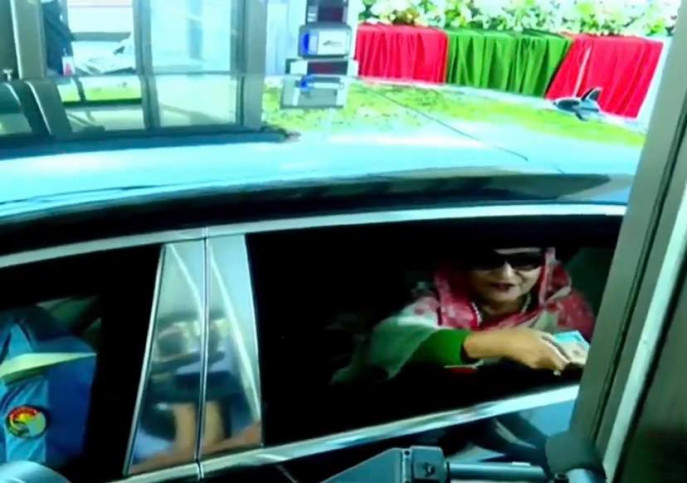Her moment of glory, our moment of pride

There was a poignant moment during Prime Minister Sheikh Hasina's speech at the inauguration of the Padma Multipurpose Bridge.
"False accusations have been brought against my younger sister Sheikh Rehana, my son Sajib Wajed Joy and daughter Sayma, Rehana's son Radwan Mujib Siddiqi, former transport minister Syed Abul Hossain, former communications secretary Mosharraf Hossain Bhuiyan," she said in a voice choking with emotion.
Her emotions were understandable. Aware of the importance of the bridge to the people of Bangladesh and its economy, she had tried her optimum best to convince the international funding organisations that her government meant business. She went so far as to transfer Hossain to a different ministry and suspend Bhuiyan.
But the latter remained unsatisfied. In the end, despite the odds being heavily stacked against her and the country, she boldly declared in parliament that Bangladesh would build the Bridge with its own funding.
Bangladesh's longest-serving head of government has many feathers in her cap to be proud of – the CHT Peace Accord, the War Crimes Trials, 100% electricity coverage, Digital Bangladesh, providing shelter to Rohingyas, LDC graduation, Bangladesh's per capita GDP growth surpassing India and Pakistan, 100% girl child enrollment in primary schools - in her 19 years in power. But the completion of the Padma Bridge, as her emotion-driven voice attested to, is an achievement that is deeply personal.
For someone who lost almost all her whole family five decades ago and narrowly escaped because she was outside the country, family obviously means everything to her. And yet, she took the insults hurled at her family with fortitude. And she responded not with words, but by personally overseeing the task of the largest infrastructure project being built in the country's history.
Yet she is not one to highlight her personal achievements. After all, despite popular demand, she refused to name the bridge after herself. Instead, she gave credit to the people of the country, as she is always prone to do.
During the speech, she said, "Bengalis are a nation of heroes. Every turn in the history of Bengal has been marked by sacrifice and bloodshed. But today the Bengalis are proud again."
Taking recourse to poetry, she added: "Jotobari hotya koro, jonmabo abar; darun surjo hobo, likhbo notun itihash." ("Every time you kill, we will be born again; we will be a great sun, we will write a new history").

Humble as she is, it was not lost on the hundreds and thousands of people celebrating the opening of the Padma Bridge as to who they owed this massive gift.
"We never imagined this would happen even in 200 years. But God gave Hasina the intelligence. They said she couldn't do it, but she is her father's daughter after all and she has shown the world what she is capable of," said Rafique, who had travelled all the way from Chattogram to Shibchar to celebrate the opening of the bridge.
The economic importance of the bridge is in many ways obvious, and will become more apparent in the days, months and years to come. But the completion of the bridge is not just about the economic value it will add, but also the symbolic value it holds.
For a country that was once denigrated as an international basket case and depended on foreign aid for most of its early decades, the sheer audacity of taking on such a massive infrastructure project, defying international funders and finishing it through its own funding, is nothing short of a miracle.
And not only did we take on the funding of the project, but we also took on the mighty Padma, part of one of the most treacherous river systems on earth. Bangladeshi engineers, inspired by the Prime Minister's resolve and backing, struggled and overcame some of the greatest engineering challenges ever faced in the building of bridges anywhere.
As the Prime Minister succinctly put it, "This bridge is not just an infrastructure of bricks, cement, steel, and concrete. It is a symbol of our pride, our ability and our dignity. This bridge belongs to the people of Bangladesh. It involves our passion, creativity, courage, endurance and our conviction and perseverance. It is that zeal which has enabled us to build the Padma Bridge... Each pillar of the bridge is a reflection of Bangladesh."
In her finest hour, she was also not someone to hold a grudge.
"I have no grievances against anyone, but those who opposed the Padma Bridge construction plan and called it a 'pipe dream', lack self-confidence. I hope the bridge will boost their confidence, "she said, after expressing her gratitude to the people involved with the construction of the Padma Bridge, including the project authority, consultants, contractors, workers, army personnel and all others.

But most of all, she paid tribute to the people, dedicating the bridge to them.
"I have lost my parents and brothers. Among you I have got back the affection of my father, the affection of my mother, the affection of my brothers. I am by your side, to establish your rights. I am ready to accept any sacrifice to change your destiny, I have fulfilled this promise," she said while addressing a rally at Jajira beyond the Padma Bridge.
On Saturday, when she stepped out of her vehicle to take in the sight of the mighty Padma as well as the bridge she stood on, she must have been going through feelings of pride and melancholy – pride at what she and her people managed to achieve, melancholy over the price she has had to pay to arrive here.
"At today's auspicious occasion I have no hatred, no antipathy for anyone. I just want to express my deep gratitude to our countrymen. I could manage to complete the impossible task only because they were beside me. And from beyond, from their resting places, my father, Bangabandhu Sheikh Mujibur Rahman, and my mother Begum Fazilatunnesa Mujib gave me courage and blessings," she said.


 Keep updated, follow The Business Standard's Google news channel
Keep updated, follow The Business Standard's Google news channel
















